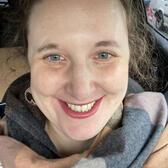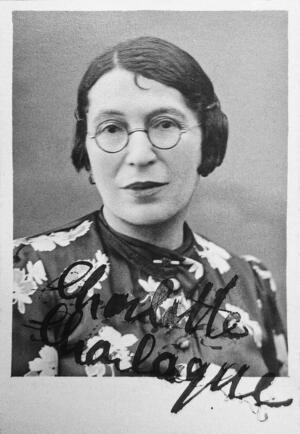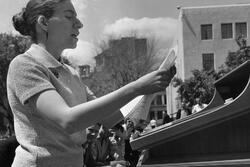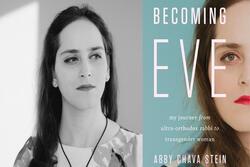Finding Strength in My Transcestor
Charlotte Charlaque is the trans ancestor, the “transcestor,” I’ve always needed. I just never thought I would find that kind of inspiration and sustenance within my own family.
For most of my life, I didn’t know my great-aunt Charlotte existed. I didn’t know Charlotte was the sister of my great-grandfather, or that she was raised in the United States and then moved back to Germany with her mother, where she was able to get official state recognition of her right to live as a transgender woman. My family didn’t have any vital information about Charlotte’s life to pass onto me, as any knowledge of Charlotte had been lost after her gender affirmation surgery and subsequent ten years spent trying to escape Nazi Germany. My family didn’t know Charlotte was one of the first trans people to receive gender affirmation surgery at the Hirschfeld Institute in the early 1930s in Germany, the first place in the world that trans people could receive this kind of care. My family didn’t know that Charlotte had a beloved named Toni Ebel, who converted to Judaism to live alongside Charlotte as her partner for ten years before Nazi Germany intruded into their love story and changed the course of their lives. We didn’t know Charlotte was an actress, a queer mentor, a recognizable figure in queer New York community in post-World War II Brooklyn.
There was so much my family did not know.
As the only self-identified queer member of my family of origin, this doesn't surprise me. Stories like Charlotte’s have a tendency to get lost in our family, to slip and slide between the pages of history, in the way that secrets do in families that don’t know how to talk about many important things.
I came out to my family as bisexual when I was fifteen, and while my parents never told me explicitly that they were unhappy with my decision to embrace this part of my identity, they also never raised the subject with me again. My parents certainly never considered attending a PFLAG meeting or acknowledging my sexual identity with others. I have inadvertently “come out” to two members of my extended family simply by talking openly about my life, without realizing my identity was so unknown, that for them, it held no name. I have been that relative whose queerness, rather than being named, is instead simply talked around. For most of my life, my identity has remained, like Charlotte’s existence, a painful secret.
Charlotte’s ghost came knocking on my door a few years ago, when a German professor, Raimund Wolfert, contacted my father, Andrew Scharlach, with questions for a book he was writing about Charlotte. My father had no idea who Wolfert was talking about. The book was deeply important to Wolfert, who was enthusiastic about the conversation he tried to initiate with my family. He asked questions my father could not answer. When my father understood the story, he relayed it to me, and asked whether I might wish to contact Wolfert myself. I did.
Thus began a six-month-long process of writing back and forth across the ocean. Wolfert and I spoke at length about the importance of his research, the value and impact of Charlotte’s story. I asked questions, again and again, that no one could answer: After Charlotte moved back to the United States, why didn’t she ever see Toni again? Toni saved Charlotte from the concentration camps by holding up Charlotte’s US citizenship and getting Charlotte deported instead, as Wolfert explained to me. Rather than preserve their love, the two separated forever, by choice. Why? Trauma, grief, the passage of time. The mind wants to believe that all things, including war, must bow before love. The mind is incorrect. I suppose we all know this, but it is still so painful to accept.
Wolfert told me that Charlotte struggled with chronic pain. As a disabled woman struggling to navigate chronic illness, I also wanted to understand this part of Charlotte’s life, to know more about how she understood this pain. Was it a consequence of unhealed emotional trauma? Was it related to her gender identity, to feeling misunderstood and displaced in her body as a child? Understandably, there was little written about this, but I was hungry for any bits of information I could get. I was trying to trace my own chronic pain through my family history, to understand where my own agony had come from.
As I explored my connection with Charlotte privately, I began to want to share her story with a wider audience. I started to write and speak about Charlotte more publicly. A transgender activist and writer named Hani Portner found me when I posted an essay about Charlotte to a Medium publication that honors the accomplishments of remarkable women throughout history. We struck up a correspondence and have spoken many times over the course of several years. We were raised only one town over from each other, yet never met or spoke until we lived on opposite sides of the world. Charlotte brought us together.
Over the years, Charlotte has had a profound impact on my life and my self-confidence. She taught me how to walk with an ancestor for as long as it takes to learn everything there is to know from that person’s story. She taught me what it feels like to be embraced for the parts of myself I had discarded as too needy, too selfish, too narcissistic, too passionate. As an actress and an artist, as well as a proud member of the queer community, Charlotte ferociously upheld the values of interconnection, self-expression, and self-love that I strive to embody.
These parts of me have not often found a mirror in my family of origin. Having Charlotte behind me has encouraged me to seek out new opportunities to embody my values in ways that used to scare me. Whether taking classes on theater of the oppressed, claiming my space in community and using my voice in queer spaces that used to scare me, or embracing polyamory as my romantic model of choice, I have changed my life for the better over these past years.
I have gone on a journey, and I have not been on that journey alone.
The ending of Wolfert’s book is a quote taken from one of our conversations. In this passage, I exclaim in gratitude for the fact that, unlike we had both previously believed, Charlotte did not in fact die alone and unloved. Instead, we learned from Wolfert’s research that once she returned to the United States, she retained her artistic and bohemian identity, starred in plays at the Chamber Theater in Brooklyn, and developed such a following that she became known by the moniker “Queen of the Promenade.” When she passed away in 1963 at the age of 70, her death made the front page of the Brooklyn Heights Press. She did not die alone and unloved. She died the beloved leader of a close-knit community who appreciated her in life and honored her in death. Long may the Queen reign.
Charlotte found a community that embraced her for the inimitable iconoclast she was. Her influence has already touched so many lives. I believe she would be delighted to know that, all these years later, she is still an inspiration to us all.







